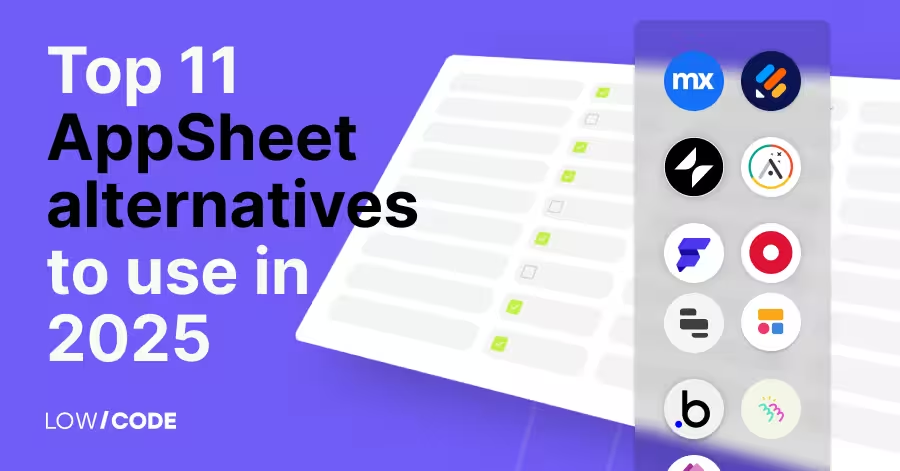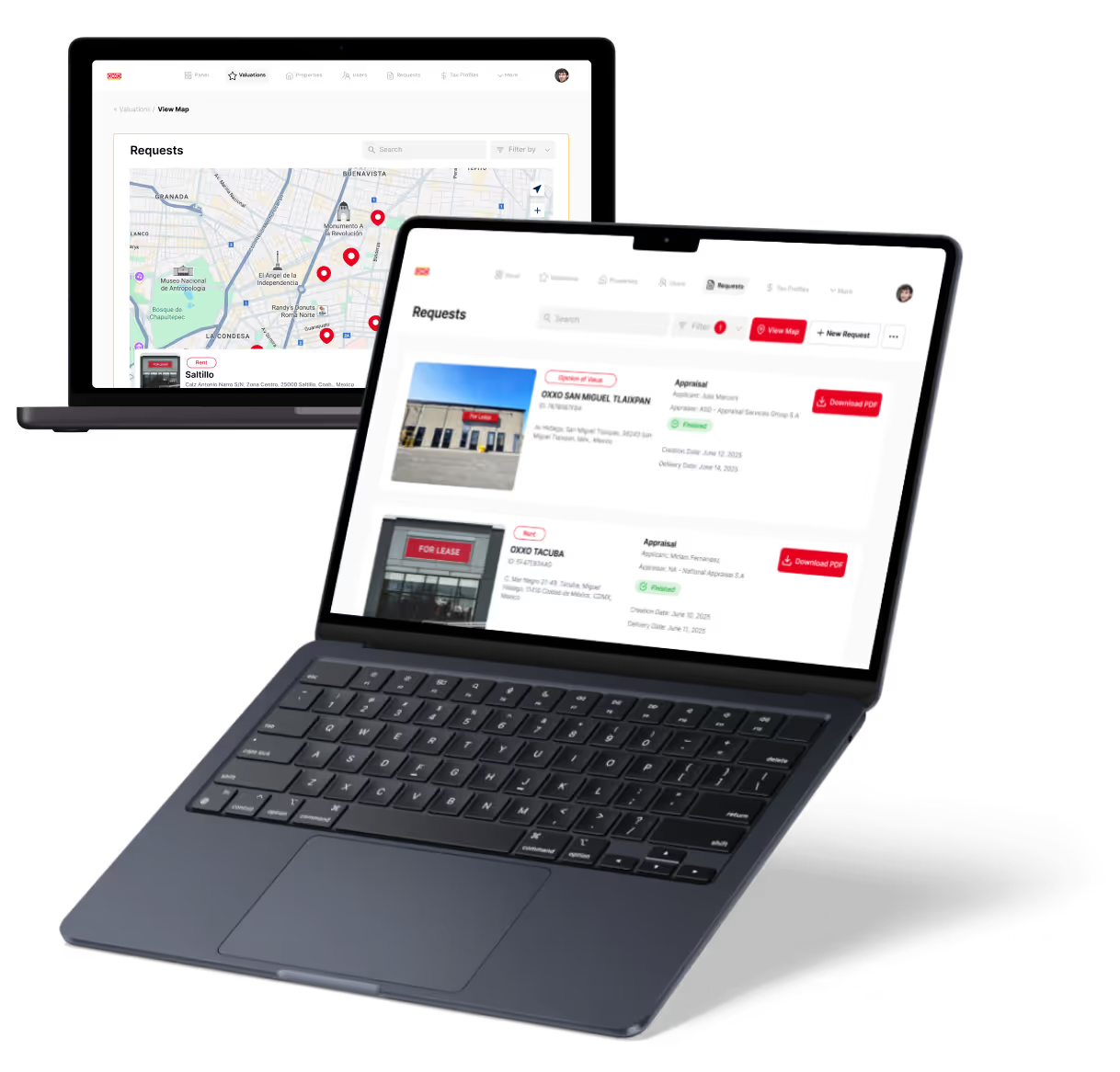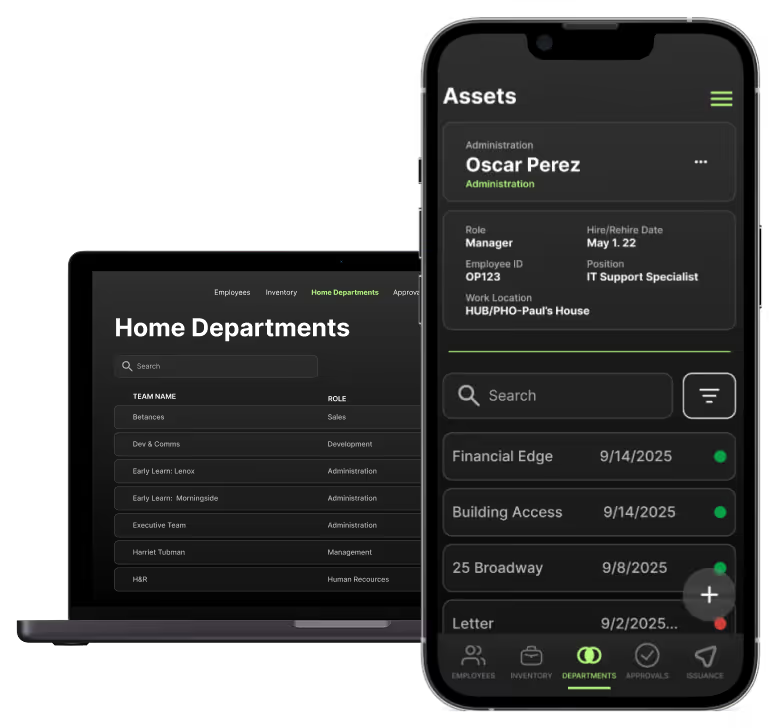Top 11 AppSheet alternatives to use in 2026
5 min
read
Looking for the best AppSheet alternatives? Try these 11 powerful picks for faster, smarter app building with better features and flexibility

Looking for AppSheet alternatives to build your next app? We've evaluated the top platforms based on our experience building over 330 no-code applications for clients across industries.
Whether you need a solution for complex business processes, mobile applications, or data-driven tools, this guide will help you find the right platform to match your specific requirements and technical skills.
TL;DR – Best AppSheet Alternatives by Use Case
What Is AppSheet?
AppSheet is Google Cloud's no-code development platform that lets you create custom mobile and web applications without coding. It connects directly with various data sources, including Google Sheets, Excel, Smartsheet, and SQL databases, transforming your data into functional apps.

Users love AppSheet for its intuitive interface, seamless Google Workspace integration, and powerful automation capabilities. The platform's AI-assisted app creation significantly reduces development time, while its responsive design ensures your app works flawlessly across devices.
AppSheet excels at creating internal tools for business operations, mobile apps for field teams, and data-driven applications that transform information into actionable insights. Organizations commonly use it for inventory management, work order processing, customer relationship management, and field service applications where real-time data access is essential.
Unique Features of AppSheet
- Spreadsheet-based logic: AppSheet is built on a familiar spreadsheet-style logic, making it easy for non-developers to create powerful functionality using formulas. You can apply conditions, validations, and calculations without writing traditional code. This is ideal for teams already comfortable with tools like Excel or Google Sheets.
- Google Workspace integration: Seamlessly connects with Google Sheets, Drive, Forms, and other Google services, making it the natural choice for organizations already using Google's ecosystem.
- Advanced capture technology: Incorporates OCR (Optical Character Recognition) and barcode scanning features that enable mobile data capture for inventory, asset tracking, and document processing.
- Quick app generation from data: You can create a working app in minutes by connecting a data source. AppSheet automatically interprets your data and generates relevant views, forms, and navigation, allowing you to focus more on refining functionality than building from scratch.
- Expressions: AppSheet expressions allow you to customize app behavior with conditional logic, dynamic filtering, and custom actions. They're similar to Excel functions but tailored to app-specific needs like user interactions and data relationships.
- Robust security controls: Security is built-in, with features like user authentication via Google or Microsoft, role-based access control, and secure data connections. Admins can define which users see or edit specific data, making it a safe choice for sensitive business workflows.
- Cross-platform deployment: Publish your app once and have it work seamlessly across web, iOS, and Android devices with responsive layouts that adapt to different screen sizes.
Limitations of AppSheet
- Rigid UI customization: While functional, AppSheet's interface offers limited design flexibility compared to other platforms, making it challenging to create highly polished, branded experiences.
- Limited offline capabilities: While AppSheet supports basic offline functionality, it's not as robust as other platforms. Complex apps may struggle to function properly without an internet connection, making it less reliable for field work or remote environments.
- Complex logic challenges: AppSheet relies on expressions similar to spreadsheet formulas, which can become difficult to manage as your app grows. Implementing multi-step logic, branching workflows, or conditional automations may require time-consuming workarounds.
- Not ideal for advanced use cases: AppSheet excels at internal tools and simple data apps but lacks the infrastructure for building more advanced products. Use cases like SaaS platforms, marketplaces, or applications requiring intricate user interactions and workflows may exceed its capabilities
- Expensive scaling: AppSheet’s pricing model charges per active user, which can add up quickly as your user base grows. This makes it less cost-effective for public-facing apps or large teams compared to flat-rate or usage-based models.
- Lack of pixel-perfect control: Unlike Bubble or FlutterFlow, AppSheet doesn't provide the fine-grained design control that allows for precise positioning and styling of elements. This limits creative freedom and precise design execution.
- Limited third-party integrations: While it connects well with Google services, AppSheet's integration capabilities with other platforms and APIs aren't as comprehensive as some alternatives.
Top Alternatives to AppSheet
1. Bubble
Bubble is a powerful no-code platform for building fully customizable web and mobile applications. It offers a fully customizable canvas, allowing you to design pixel-perfect UI elements while creating complex workflows and database structures.

As an AppSheet alternative, Bubble excels in giving you greater control over your application's design and functionality. Unlike AppSheet's somewhat rigid structure, Bubble's flexibility enables you to create virtually any web application, from marketplaces to social networks to SaaS platforms. Its extensive plugin ecosystem and API Connector let you integrate with nearly any third-party service.
Despite its strength, Bubble presents a more challenging learning curve compared to AppSheet. Additionally, it also doesn’t allow full code export, which can create vendor lock-in. Performance optimization requires careful setup, especially for data-heavy apps.
2. Glide
Glide transforms your data into polished, professional apps in minutes. It connects with various data sources, including Google Sheets, Excel, Airtable, and its own built-in database system, to create responsive applications that work seamlessly across all devices.
What makes Glide shine as an AppSheet alternative is its exceptional ease of use and elegant, modern templates. You can create visually appealing apps much faster than with AppSheet, with a minimal learning curve.

Glide also offers powerful features like user authentication, payments processing, and form submissions while maintaining simplicity throughout the building process. It also offers built-in AI features, automation, and responsive designs.
The platform does have limitations when it comes to complex workflows and custom functionality. While perfect for data-driven apps like directories, MVPs and internal tools, Glide lacks advanced customization and logic complexity, so it may not be the best option for apps that need intricate workflows or extensive UI flexibility.
3. FlutterFlow
FlutterFlow is a visual development platform that lets you build native mobile applications using Google's Flutter framework without writing code. The platform generates production-ready Flutter code that you can export, modify, and deploy to both iOS and Android app stores.

As an AppSheet alternative, FlutterFlow delivers superior mobile experiences with native performance and advanced UI capabilities. Its visual canvas gives you precise control over design elements while supporting complex state management and animations. For organizations that prioritize high-quality mobile experiences, FlutterFlow offers significant advantages over AppSheet's web-first approach.
The learning curve is steeper, especially if you're unfamiliar with design or app architecture. For non-technical users, FlutterFlow may feel overwhelming compared to more beginner-friendly platforms.
4. PowerApps
PowerApps is Microsoft's no-code development platform that enables businesses to create custom applications that connect to their data and work across web and mobile. It's deeply integrated with the Microsoft ecosystem, including Office 365, Dynamics 365, and Azure services.

For organizations already invested in Microsoft products, PowerApps provides a more seamless experience than AppSheet. Its tight integration with Microsoft Dataverse and Power Automate enables sophisticated workflows and business process applications. PowerApps also offers AI Builder capabilities for incorporating intelligent features into your applications.
The platform's main drawbacks include its relatively high learning curve and pricing structure that can become expensive as you scale. PowerApps is also most effective when used within the Microsoft ecosystem, making it less versatile for organizations using a diverse tech stack.
5. OutSystems
OutSystems is a comprehensive low-code development platform focused on building scalable enterprise applications with strong backend integration and cloud deployment. It combines visual development tools with the ability to extend functionality through custom code when needed, making it suitable for complex business applications.

Unlike AppSheet, OutSystems offers superior scalability and performance for mission-critical applications. Its enterprise-focused features include advanced security, governance tools, and deployment options. The platform excels at creating applications that integrate with multiple systems and handle complex workflows across large organizations.
However, OutSystems isn't ideal for small projects or teams seeking quick deployments. It requires significant investment in both cost and learning curve, with pricing that's generally higher than AppSheet. The platform is designed for professional developers and IT teams rather than business users looking for simple no-code solutions.
6. Mendix
Mendix is an enterprise low-code application development platform that enables both developers and business experts to build multi-channel applications. It offers collaborative tools that bridge the gap between business and IT, streamlining the development process.

As an AppSheet alternative, Mendix provides stronger enterprise integration capabilities and more sophisticated application lifecycle management. Its multi-team collaboration features and model-driven development approach enable faster delivery of complex applications. Mendix also offers robust offline mobile functionality that surpasses AppSheet's capabilities.
The platform's enterprise focus means it's generally less suitable for small teams or simple applications. Mendix has a steeper learning curve compared to AppSheet and requires a greater investment in training and resources. Its pricing is also geared toward larger organizations rather than individual developers or small businesses.
7. Retool
Retool is a development platform that allows you to build internal tools quickly by combining pre-built components with custom code. It connects to virtually any database or API and gives you the flexibility to add JavaScript when needed for more complex functionality.

Where Retool stands out from AppSheet is in its focus on internal business applications with sophisticated data manipulation capabilities. Technical teams can build powerful admin panels, dashboards, and CRUD applications much faster than with traditional development. Retool's SQL interface and ability to integrate custom React components make it particularly appealing for developer-adjacent teams.
The main limitation is that Retool isn't designed for customer-facing applications or mobile experiences. It also requires some coding knowledge to unlock its full potential, making it less accessible to pure business users who might prefer AppSheet's no-code approach.
8. Softr
Softr is a no-code platform specifically designed for creating client portals, web apps, and community websites based on Airtable or Google Sheets data. It offers a block-based approach with specialized components for membership sites, directories, and marketplaces.

Unlike AppSheet's broader focus, Softr excels at creating beautiful, modern web interfaces with minimal effort. Its specialized blocks for specific use cases allow you to build functional web applications in hours instead of days. Softr's user management and membership capabilities are particularly strong for community and client-facing applications.
However, Softr lacks AppSheet's mobile application capabilities and has more limited data handling for complex operations. It's primarily focused on web applications with predefined use cases rather than custom business process applications, making it less versatile but more streamlined for its target scenarios.
9. Adalo
Adalo is a no-code platform that enables you to build native mobile and web applications with a visual, component-based editor. It offers a library of customizable components and the ability to connect to external APIs and databases.

Compared to AppSheet, Adalo provides greater design flexibility and a more intuitive visual interface for creating mobile-first experiences. Its component marketplace and built-in integrations allow for quicker development of customer-facing applications with modern, native-feeling interfaces on both iOS and Android.
The platform's limitations include less robust data handling for complex operations and fewer enterprise-grade features than AppSheet. Adalo also has scaling challenges with larger applications and datasets, making it better suited for smaller to medium-sized projects rather than enterprise-wide deployments.
10. Bravo Studio
Bravo Studio turns your Figma designs into fully functional mobile applications without coding. It bridges the gap between design and development by allowing you to create native apps directly from your design files with added functionality.

What sets Bravo apart from AppSheet is its design-first approach. If visual quality and brand consistency are priorities, Bravo offers superior control over the user interface. Designers can work in Figma and transform those designs into working applications with real data connections.
The main drawbacks are Bravo's more limited data manipulation capabilities and business logic compared to AppSheet. It's primarily focused on creating beautiful front-end experiences rather than complex back-end processes, making it less suitable for data-intensive business applications but excellent for brand-conscious consumer-facing apps.
11. Jotform Apps
Jotform Apps allows you to create mobile-friendly applications centered around forms and data collection. It extends Jotform's powerful form builder with app-building capabilities, enabling you to combine multiple forms, data tables, and integrations into a cohesive application.

As an AppSheet alternative, Jotform Apps offers a significantly lower learning curve with specialized features for form-centric workflows. Its extensive template library and pre-built integrations make it particularly effective for applications focused on data collection, approvals, and simple business processes.
The platform is more limited in scope than AppSheet, focusing primarily on form-based applications rather than general-purpose app development. While excellent for specific use cases like surveys, registrations, and data collection workflows, it lacks the breadth of capabilities for more complex business applications that AppSheet provides.
How to Choose the Right AppSheet Alternative
- Define your project goals: Identify whether you're building an MVP, internal tool, customer-facing application, or enterprise solution. Each platform excels at different use cases. MVPs and internal tools may benefit from platforms like Glide or Softr, while enterprise apps or scalable SaaS products might require Bubble, FlutterFlow, or Outsystems.
- Assess your technical skills: Be honest about your team's capabilities. Platforms like Glide and Softr are accessible to beginners, while Bubble, FlutterFlow, OutSystems, and Retool offer more power but require a steeper learning curve. Consider who will maintain the application long-term and choose a platform that matches their skill level.
- Evaluate your budget constraints: Consider both immediate and long-term costs. Some platforms offer free tiers (Glide, Bubble) but impose limitations, while others charge per user (PowerApps) or based on usage metrics that can significantly impact costs as you scale. Look beyond the starting price to understand how costs will grow with your user base.
- Clarify deployment requirements: Determine if you need a web application, progressive web app (PWA), or true native mobile experience. FlutterFlow and Adalo excel at native mobile apps, while Bubble and Retool are stronger for web applications. Consider whether your users need app store distribution or if browser-based access is sufficient.
- Consider design flexibility needs: Assess how much control you need over the user interface. Platforms like Bubble, FlutterFlow, or Bravo Studio offer superior design freedom, while data-focused platforms like Retool prioritize functionality over aesthetics. If brand consistency and visual polish are priorities, choose platforms with pixel-perfect control and custom styling options.
- Map out integration requirements: List the systems your app needs to connect with. Glide works seamlessly with various data sources, Bubble offers extensive API capabilities, and PowerApps integrates deeply with Microsoft services. Ensure your chosen platform supports both your current and anticipated future integration needs. Check compatibility with tools like Airtable, Zapier, Make, or external databases.
Who Should Still Use AppSheet?
- If you're deeply tied into Google Workspace: Organizations that heavily rely on Google Sheets, Forms, and other Google services will benefit from AppSheet's native integration with these tools. The seamless data flow between Google products makes AppSheet a natural extension of your existing workflow rather than introducing a completely new system.
- Need something simple for internal use: For straightforward internal tools that don't require complex logic or sophisticated interfaces, AppSheet provides a quick path from concept to deployment. Its database-centric approach works well for inventory tracking, field reports, simple approval workflows, and other operational tools where function takes priority over form.
- Don't need full custom UI: When your application's user experience isn't a primary concern and stakeholders are satisfied with a functional interface rather than a highly polished one, AppSheet's pre-built components offer adequate solutions. The platform handles the basics well without the design overhead required by more flexible alternatives.
- Have non-technical team members needing spreadsheet-based logic: Teams comfortable with Excel or Google Sheets formulas will find AppSheet's expression-based approach familiar and accessible. This allows business users who understand their data well to create useful applications without learning new programming concepts or visual development paradigms.
Quick Comparison Table
Hire LowCode Agency to Build Your Next App
At LowCode Agency, we've built over 330 custom applications across several platforms featured in this guide. Our team of certified developers specializes in transforming your ideas into functional, scalable applications without the high costs and long timelines of traditional development.
We've helped businesses of all sizes, from startups launching their MVPs to enterprises streamlining their operations, choose the right platform for their specific needs. Our expertise spans Bubble, Glide, FlutterFlow, and other leading no-code platforms, ensuring you get a solution perfectly tailored to your requirements.
Not sure which platform is right for your project? We offer free consultations to help you navigate your options and make the best choice for your specific use case, technical requirements, and budget.
Ready to bring your app idea to life? Book a free discovery call with our team today and let's discuss how we can help you build a solution that drives real results for your business.
Created on
June 23, 2024
. Last updated on
January 6, 2026
.

FAQs
What is better than AppSheet?
Why is AppSheet so slow?
Are there any open-source alternatives to AppSheet?
What are the disadvantages of Google AppSheet?
Can you sell apps made with AppSheet?
How long can I use AppSheet for free?
















